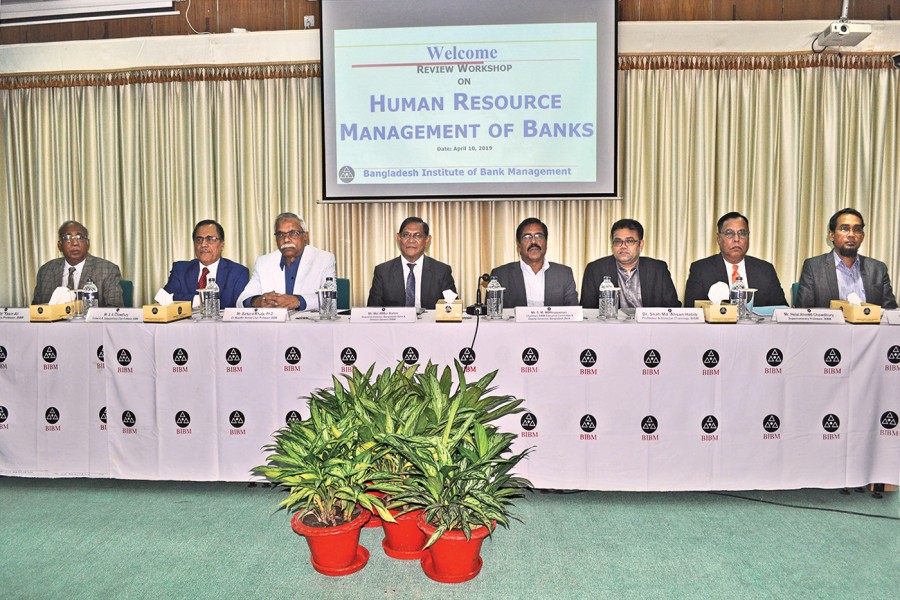An overwhelming majority of the bank employees feel that the violations of ethical code of conduct among the bankers are increasing, a recent survey has found.
At the same time, almost half the bank employees believe that there is an absence of ethical leaders in the banking industry, said the survey conducted by Bangladesh Institute of Bank Management (BIBM).
The findings of this research were revealed during a seminar in the capital on Wednesday. BIBM has produced the report based on surveys conducted on the employees of 30 banks across the country.
Around 61 per cent of bank employees believe that the violations of ethical conduct among the banks are increasing, the researchers said.
Such trends are alarming for the whole banking industry, they warned.
"Increase in NPL (non-performing loan), violation of ethical code of conduct, fraud, forgery and decline in the profitability of the banks are due to the absence of ethical leaders in banks," said Dr. Mohammad Tazul Islam, Associate Professor of BIBM, who has led the research team.
"Most importantly, 49 per cent employees said that there is an absence of ethical leaders in the industry," Mr. Islam said while noting that ethical leadership should be groomed and developed from the beginning of the orientation programme.
Meanwhile, the BIBM study found that the number of hierarchy in banks is varying considerably, which creates confusion among the bank employees.
Currently, there are a maximum of 33 job ladders in private commercial banks while the there are a minimum of 10 ladders in the state-owned commercial banks.
"Around 77 per cent employees have a vision map to reach the top management position of the bank."
"After joining as a probationer-the employees need, on average, 29 years and a maximum of 37 years to reach the top management position if they get regular promotion," said Mr Islam.
The BIBM research found that the employee turnover rate has increased alarmingly in the private commercial banks in recent years.
The employee turnover rate has increased to 9.9 per cent from 6.89 per cent in the private commercial banks while it has decreased by four times to 2.47 per cent from 9.67 per cent in state banks, the report said.
The private banks should consider this factor significantly to reduce employee turnover rate by ensuring good working environment, reducing job stress, offering better compensation and good employee relationship, said the researchers.
Focusing on the findings of the study, speakers at the seminar called for simplifying the hierarchy in the private banks and a shift towards strategic HR management.
"With growing competition in the banking sector, efficient human resource is becoming crucial for the banks to sustain," said S M Moniruzzaman, Deputy Governor of Bangladesh Bank.
"In this context, effective human resource management is crucial for increasing the efficiency of the banks in the country," he added.
"The top management of the banks should have some minimum knowledge and training in HR issues," said Yasin Ali, supernumerary professor of BIBM.
Noting the high turnover rate of the PCBs, Mr. Ali said that in many cases, the bank employees have to leave an organisation after 20 years of service.
"This is simply inhumane," said Mr. Ali, who was previously an executive director of Bangladesh Bank, adding that the central bank should intervene in this issue to ensure better job security of the bank officials.
"There should be better synchronisation between rank, seniority and posting of the employees," said Helal Ahmed Chowdhury, a Supernumerary Professor of BIBM.
In doing so, the banks should prepare a fit list and should post their employees in alliance with that fit list to meet the actual requirement of their branches, said Chowdhury, a former Managing Director of Pubali Bank.
"Currently, our banking industry is too much focused on the operational side of HR. But, in complying with the modern banking industry, we have to shift towards strategic HR management," said S. A. Chowdhury, a former Chairman of Bangladesh Krishi Bank.
"We are also losing our touch with the supply chain," said Chowdhury, who was a former Managing Director of Sonali Bank.
"We have to strengthen our ties with the universities since they are the ones who supply our future human resource," he added.
Dr. Muzaffer Ahmad Chair Professor of BIBM Dr. Barkat-e-Khuda also spoke on the occasion.


